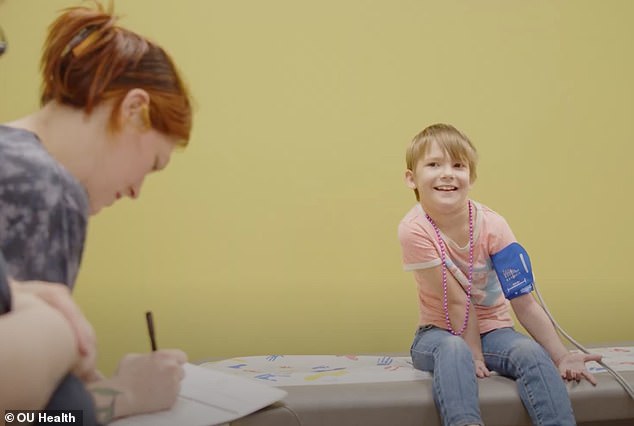An eight year-old with paralyzing brain damage regained the ability to move on her own — thanks to a first-of-its-kind implant surgery involving a robot.
Before the lengthy operation, Karleigh Fry, from Oklahoma, was paralyzed and could not eat, walk or even sit up on her own. Now, she can lift her arms above her head, and there are signs she is beginning to move other body parts.
A robotic device fitted an electrical implant into her brain to ‘reawaken’ areas involved in movement.
While the robot — which is operated by surgeons — has been used in the past to implant brain stimulators, this is the first time the procedure has ben performed on a child.
Dr Amber Stocco, the pediatric neurologist involved in the procedure described the surgery as a ‘milestone’.


Karleigh Fry, eight, was unable to move her arms until the procedure to implant a ‘pacemaker for the brain’


Doctors are hailing their achievement as a gamechanger for the use of robotics in brain surgeries in children
‘Our young patient is already showing promising results, and we hope this procedure will pave the way for more pediatric cases worldwide.’
Meanwhile, Karleigh’s mother, Trisha Fry, said the family saw improvements the moment the doctors turned the electrical device on, adding, ‘I think she’s going to have a great future for sure.’
Karleigh suffers a hereditary condition called rapid-onset primary dystonia, a neurological illness that causes painful muscle contractions and abnormal movements. In some cases, the muscle pain is so severe it can prevent patients from moving.
Doctors believe that the condition causes abnormal electrical patterns in the brain, especially in areas that concern involuntary movement.
The form of dystonia that Ms Fry has is the genetic kind that is less common in children. The more common cause in children is a brain injury, such as a stroke or cerebral palsy.
The stimulating electrodes inserted into her brain helped interfere with abnormal activity, restoring normal movement patterns.
The device, called a deep brain stimulation implant, is similar to a pacemaker, but for the brain.
It involves the placement of a pulse generator that sends electrical signals to the parts of the brain that control body movement. It can either inhibit overactive neural connections of activate underactive ones, depending on the condition.
The tool is also used to treat Parkinson’s disease, tremors, epilepsy, obsessive compulsive disorder, and dnoepression.
Dr Amber Stocco, pediatric neurologist and medical director of Child & Adolescent Neurology at Bethany Children’s Health Center, a partner of the OU Health doctors, said their team is now ‘on the leading edge of what’s happening in the world of deep brain stimulation, as well as robotics.’
Robotic surgery is nothing new. The Da Vinci robot, often used for cardiac and thoracic surgery, has been in use since the year 2000, and it has been used on babies.
Dr Andrew Jea, the Oklahoma Children’s Hospital pediatric neurosurgeon who operated on her, said: ‘This marked the global debut of using a robot from our operating rooms to perform deep brain stimulation in a child, setting a precedent not only in Oklahoma but also across the United States and worldwide.’
Source: Mail Online







